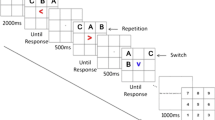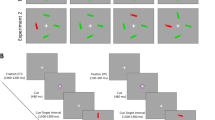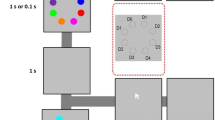Abstract
The Simon effect is the performance advantage for spatially corresponding, compared to non-corresponding, target-response ensembles when the location of the target is task irrelevant. In four experiments, we tested the predictions of the attention-shift account of the Simon effect. In all experiments, subjects made choice responses with respect to the identity of a central target that followed a spatially non-informative peripheral precue. The first experiment showed a Simon effect away from the precue when the precue was a go/no-go signal: responses to spatially non-corresponding precue-response pairs were faster than responses to spatially corresponding precue-response pairs. The results of the second experiment suggested that this “reverse” Simon effect was not due to inhibition. In the third experiment, a secondary working memory task required the encoding, and later recall, of “oddball” precues. Although the Simon effect was absent, larger Simon effects towards the precue (i.e., responses were faster to spatially corresponding, compared to non-corresponding, precue-response ensembles) were correlated with poorer performance on the memory task. In the last experiment, the identity of completely non-informative precues was congruent, incongruent, or unrelated to the identity of the target. With precues that were unrelated to the identity of the target, there was a Simon effect towards the precues. Conversely, the Simon effect occurred away from the precue when the identity of the precue was related to that of the target. The findings suggest that a shift of attention alone is not sufficient to produce the Simon effect. Rather, the shift of attention must originate from an intentionally defined object. The results are discussed within a framework that integrates the attention-shift and referential-coding hypotheses.
Similar content being viewed by others
Author information
Authors and Affiliations
Additional information
Received: 2 December 1999 / Accepted: 23 March 2000
Rights and permissions
About this article
Cite this article
Ivanoff, J., Peters, M. A shift of attention may be necessary, but it is not sufficient, for the generation of the Simon effect. Psychological Research Psychologische Forschung 64, 117–135 (2000). https://doi.org/10.1007/s004260000033
Issue Date:
DOI: https://doi.org/10.1007/s004260000033




